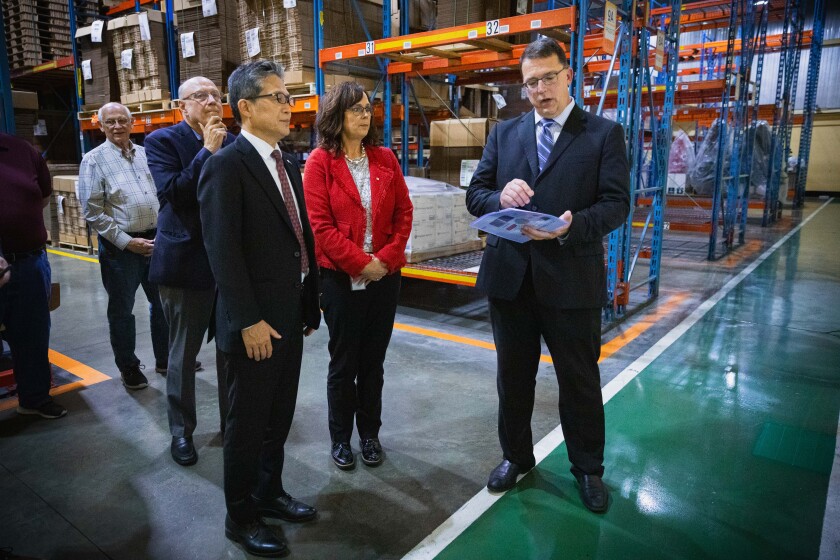MITCHELL — Automation, safety and even tariffs are helping play a part in the yearly exports of a local toner manufacturer sending South Dakota exports to Japan.
Consul-General of Japan (Chicago) Masashi Mizobuchi on Tuesday, Aug. 12, toured the Japanese-owned Etria Products USA toner manufacturing plant on South Foster Street in Mitchell, and to meet with state leaders at the Midwest Ag Export Summit on Wednesday, Aug. 13, in Sioux Falls.
Japan received South Dakota exports to the tune of $85 million in 2024. Japan is the fourth-largest market for South Dakota exports, including beef, and the third-largest market for South Dakota pork. Ahead of Japan’s import of South Dakota products is Canada, Mexico and China.
There’s ample room for additional Japan-South Dakota trade, according to Consul-General Mizobuchi, who saw South Dakota as a land of opportunity for agriculture, innovation and technology.
“I hope my visit will be an opportunity to build relationships that will facilitate Japanese trade with this great state,” Consul-General Mizobuchi said.
Consul-General Mizobuchi was impressed that Etria ran three shifts. He was pleased that a Japanese company was contributing to the community with almost 100 jobs, a high-quality workforce, and what he called a friendly business environment.
“I hope they grow their business here, make people stay happy and expand more jobs,” Consul-General Mizobuchi said.
The consul-general seeks to strengthen Japan’s ties with each of the 10 US mid-west region states in the consul-general’s district.
The Etria toner plant formerly operated in Mitchell as Toshiba for 36 years until 2024, when Toshiba and Ricoh formed a joint partnership under the banner name of Etria Products USA.
Automation and safety are pillars of the toner manufacturer. Color-coded walkways and aisles lead employees and guests safely around the 188,000-square-foot facility. Sound-proof doors shield employees from the noise of materials being prepared to become toner and every tool has a place and a label.
Etria’s 95 employees work across three shifts a day up to five days a week to produce 750 toner cartridges per eight-hour shift. Empty cartridges go down the line, are filled with toner, sealed and exit the automated line to be packaged by an employee. An automated robotic arm then takes the packaged box and stacks it on a pallet.
One day the line produces a magenta color, the next may be cyan, according to Etria Vice President of Manufacturing Engineering Jeff Clark.
The toner corrugated cardboard packaging box is folded by an automated machine that was built by Etria engineers in Mitchell with over 100 parts that were 3-D printed. Before the folding machine, the boxes were folded by hand and there were some injuries, according to Clark, who started with Toshiba 34 years ago.
“34 years ago we had none of that automation. It was all just people,” Clark said.
A series of monitoring sensors helps regulate air compressors and the heat produced by machinery in the facility.
The packaging department also handles packaging toner to export to China and Japan. Each of the three bags is 20 kilograms, which comes out to about 130 pounds of toner, according to Clark.
Mitchell Chamber of Commerce CEO Mike Lauritsen highlighted how much is produced in Mitchell and is shipped internationally from one of Mitchell’s largest employers.
“It’s having meetings like these that make our relationships stronger,” Lauritsen said.

Teresa Sternhagen leads Consul-General of Japan Masashi Mizobuchi through a tour around Etria on Tuesday, Aug. 12, 2025, in Mitchell.
Adam Thury / Mitchell Republic

Teresa Sternhagen leads Consul-General of Japan Masashi Mizobuchi through a tour around Etria on Tuesday, Aug. 12, 2025, in Mitchell.
Adam Thury / Mitchell Republic
Etria General Manager Teresa Sternhagen is preparing Etria to produce more products in the US because of the recent Trump administration import tariffs. These products were originally packaged in China and sold back to the U.S.
“We’re actually bringing in (and) qualifying that product here and then be able to sell to the U.S. market. That’s one of the largest changes recently, Sternhagen said.
Even if the tariff were to be removed, the product would stay in the U.S., according to Sternhagen.
“Are we excited to have new product? Of course we are,” Sternhagen said. “But do we like to pay out all those tariffs? No.”
According to Sternhagen, it’s tough to plan business and forecast the impact of the tariffs. There’s good and bad with everything, Sternhagen said.
“Can we bring enough product back to the U.S. to actually help pay for all the new tariffs that will be paying out to import raw materials?” Sternhagen said.
Marshall Mitchell is a reporter with the Mitchell Republic covering local news and politics. He has over 15 years of experience working with leaders, authors, non-profits, and small businesses in publishing, marketing, and content creation. He moved to Mitchell in December 2024, and can’t wait to hear from you. Reach out to him at mmitchell@mitchellrepublic.com.



AloJapan.com